
Shocking new data has exposed a deepening crisis within NHS cancer care, with patients across England facing an 'unacceptable' postcode lottery for life-saving treatment.
According to a damning analysis by Macmillan Cancer Support, nearly 30,000 people endured waits of more than two months to begin their treatment following an urgent GP referral last year. This figure represents a staggering 47% increase compared to pre-pandemic levels.
A Devastating Postcode Lottery
The report highlights vast regional disparities in care. Patients in the Midlands and the North of England were disproportionately affected, with some integrated care boards (ICBs) missing the crucial 62-day waiting time target for over half of their patients.
The worst-performing areas included:
- Staffordshire and Stoke-on-Trent ICB: 54% of patients waited too long
- Humber and North Yorkshire ICB: 53% of patients waited too long
- Cheshire and Merseyside ICB: 52% of patients waited too long
Experts Sound the Alarm
Macmillan's Chief Executive, Gemma Peters, issued a stark warning: "Behind these figures are people living through anxiety and uncertainty, and in the worst cases, seeing their chances of survival damaged due to unacceptable delays."
She emphasised that the data proves the crisis is "not a temporary blip" but a clear sign of a health service buckling under immense pressure, struggling with severe staff shortages and a lack of long-term government investment.
The Human Cost
These delays are not merely statistics. Every week of postponement can increase a patient's anxiety and, critically, potentially impact their prognosis. The NHS's own target states that 85% of cancer patients should start their treatment within 62 days of an urgent referral. This target has not been met nationally for over a decade.
An NHS England spokesperson acknowledged the challenges, citing record numbers of people coming forward for cancer checks. They stated that staff are "working tirelessly" to ensure patients are diagnosed and treated as quickly as possible.
However, for the tens of thousands left in agonising limbo, action cannot come soon enough. This analysis serves as a urgent call to policymakers to address the systemic failures plaguing the nation's cancer care services.





